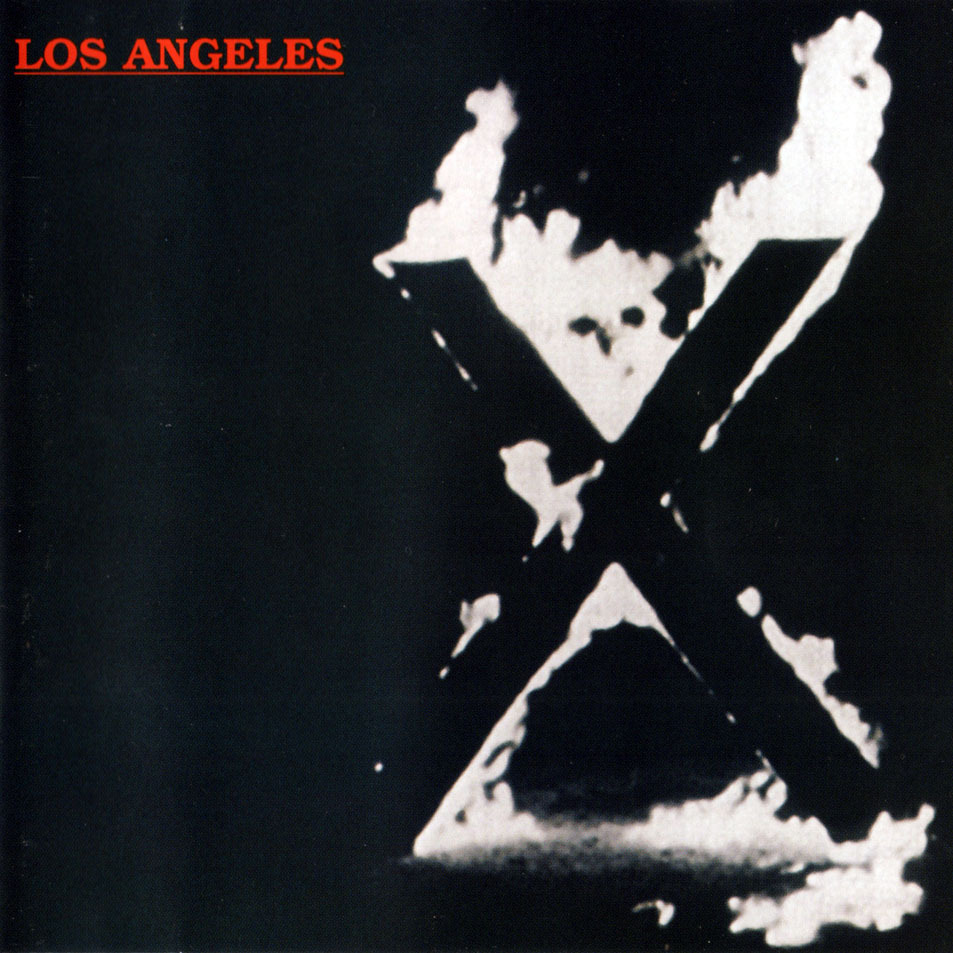X were locked out of the public eye, talking out of harmony with this hotter than hot, hectic punkabilly nausea. The group had formed in 1977 and became a vital part of the developing punk scene, releasing a single "Adult Books" / "We're Desperate" the next year on the local Dangerhouse label. They moved to Slash Records for their debut album. 'Los Angeles' was recorded at Golden Sound Studios in Hollywood, California with Ray Manzarek of The Doors producing. The sessions featured the quartet of Exene Cervenka on vocals; John Doe on bass and vocals; Billy Zoom on guitar; and D.J. Bonebrake on drums; with Manzarek playing organ.
Cervenka looks back: "John [Doe] and I both came to L.A. from the East Coast. I came from Florida and he came from Baltimore. We met at this poetry workshop in Venice, California where Jim Morrison used to hang out and where the skate kids were hanging out in '76, and we hit it off immediately. And he had already met Billy [Zoom] and the band started. Like, punk was starting, the band was starting, poetry was happening. It was amazing. And in the meantime you had Fleetwood Mac, Linda Ronstadt, the Record Plant--which is a recording studio--cocaine, limousines. You know, swimming pools, movie stars, the whole thing, right? And we were part of these poverty-stricken people trying to make it as alternative beings in the universe. So it was a love/hate thing from the day we got there. And it's always been a love/hate thing."
Doe delineates: "X was always press-driven because we didn’t have airplay, or exposure to radio airplay, or big crowds, because no one would have us open for them. So we were press-driven and, I guess, controversial in that we have a core audience of subculture. There are two typical responses to X. It’s either, “You changed my life,” or “Who?” ... [X outlasted other bands for] all the reasons that anyone survives. A certain amount of ambition, a certain amount of talent, and determination. We like making a living playing music. I think that X had songs and musicianship that were a little apart from other bands in L.A., and maybe if they had more of the ambitions or determination or the other elements, they might have found something that was as lasting ... Punk rock was anything that wasn’t old and in the way. I don’t know who coined that phrase. There’s a line that was drawn in 1975, maybe even a little earlier. It was, “This is no longer corporate rock, this is no longer glam.” Iggy and the MC5 were doing it, but they were doing it in a little more of a vacuum. Once the New York bands started doing their thing, which was a spin-off of maybe Andy Warhol and the New York Dolls and that sort of thing, it went over to England, came around to L.A., and went to San Francisco, Boston, D.C. and a million other places. It was in the air and all those bands were punk rock bands, but punk rock wasn’t codified and it wasn’t just one sound. Maybe by 1979, or even earlier, it became more of a thing. When the hardcore scene started coming in, the bands sounded more similar to each other ... I think it was more a descendent of what Chuck Berry, Little Richard, Eddie Cochran and Gene Vincent were doing, and maybe with the Ramones and Blondie you would have to include doo-wop bands like Darlene Love or the Ronettes. If you take Jimmy Reed and then listen to Chuck Berry, Chuck Berry took Jimmy Reed from 33 and sped it up to 45, and we took Chuck Berry and sped it up to 78. We couldn’t get airplay because punk rock was dangerous. The hair bands, or whatever you want to call that, were not dangerous because it was cartoonish, and it also played into, in my opinion, sort of a male-dominated, “Women are just playthings, an item, a possession.” Those bands got plenty of exposure, but punk rock was for real dangerous. It was openly gay, openly druggies, you can’t control me, I don’t want to play your game, f--k you. I think we saw ourselves in a timeline of, “There is rock and roll, and there were the beatniks and the drug-addled hippies like the Doors and the Rolling Stones in their ’70s phase, and OK, it’s punk rock’s turn.” There were all these bands and we pissed off the media to the point that they said, “Oh no.” The record companies were pretty fat and set in their ways and they didn’t want to know about these upstarts, so nothing happened."
http://xtheband.com/
"Los Angeles"
https://www.youtube.com/watch?v=Exs-mcKApxI
"Nausea"
from 'The Decline of Western Civilization'
"Johnny Hit and Run Paulene"
"The World's a Mess; It's in My Kiss"
on New Wave Theater
https://www.youtube.com/watch?v=wjJ6m00r6pg
'Los Angeles'
full album:
All tracks written by John Doe and Exene Cervenka except as indicated.
Side A
1. "Your Phone's Off the Hook, But You're Not" 2:25
2. "Johnny Hit and Run Paulene" 2:50
3. "Soul Kitchen" John Densmore, Robbie Krieger, Ray Manzarek; Jim Morrison 2:25
4. "Nausea" 3:40
5. "Sugarlight" 2:28
Side B
6. "Los Angeles" 2:25
7. "Sex and Dying in High Society" 2:15
8. "The Unheard Music" 4:49
9. "The World's a Mess; It's in My Kiss" 4:43
bonus tracks
"I'm Coming Over" (Demo version) – 1:24
"Adult Books" (Dangerhouse Rough Mix version) – 3:21
"Delta 88" (Demo version) – 1:28
"Cyrano de Berger's Back" (Rehearsal) – 3:01
"Los Angeles" (Dangerhouse version) – 2:14
'X: The Unheard Music' documentary



No comments:
Post a Comment